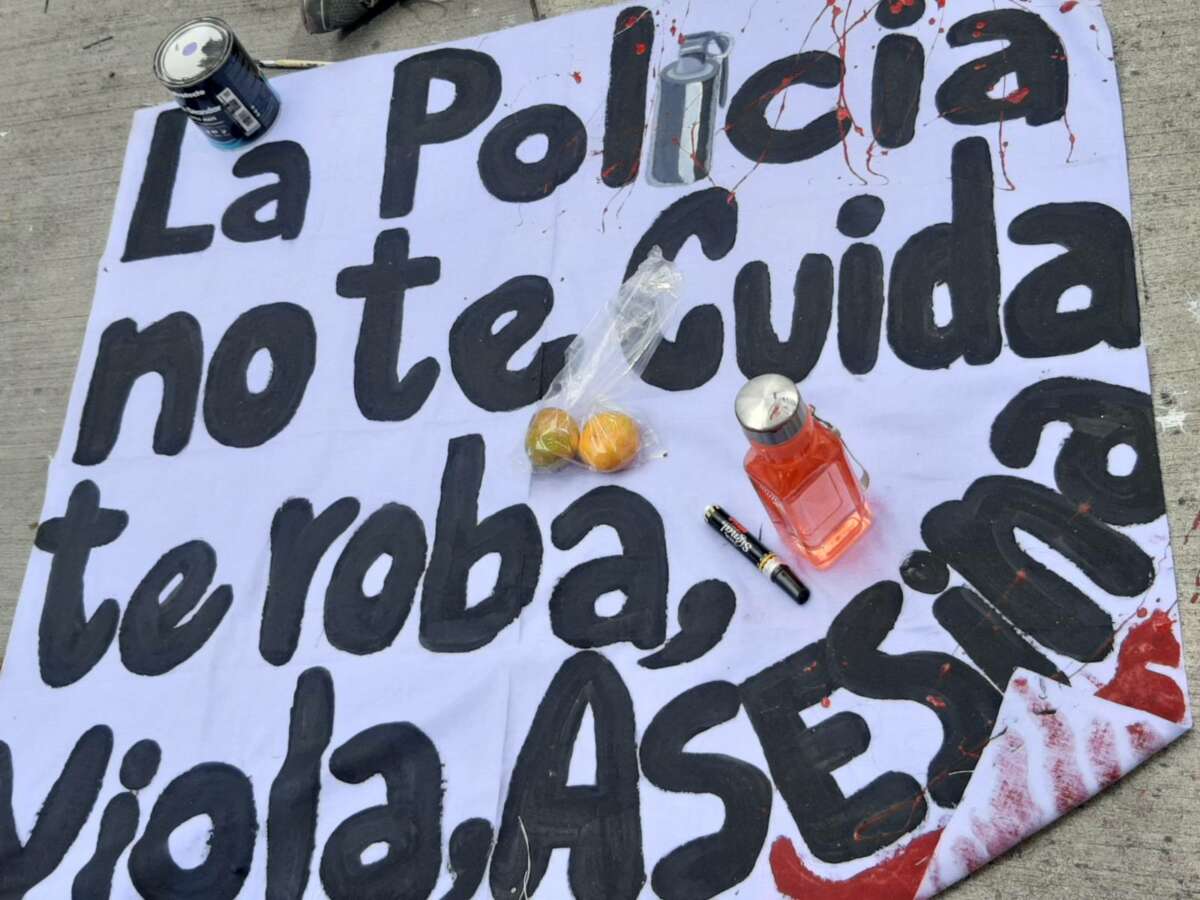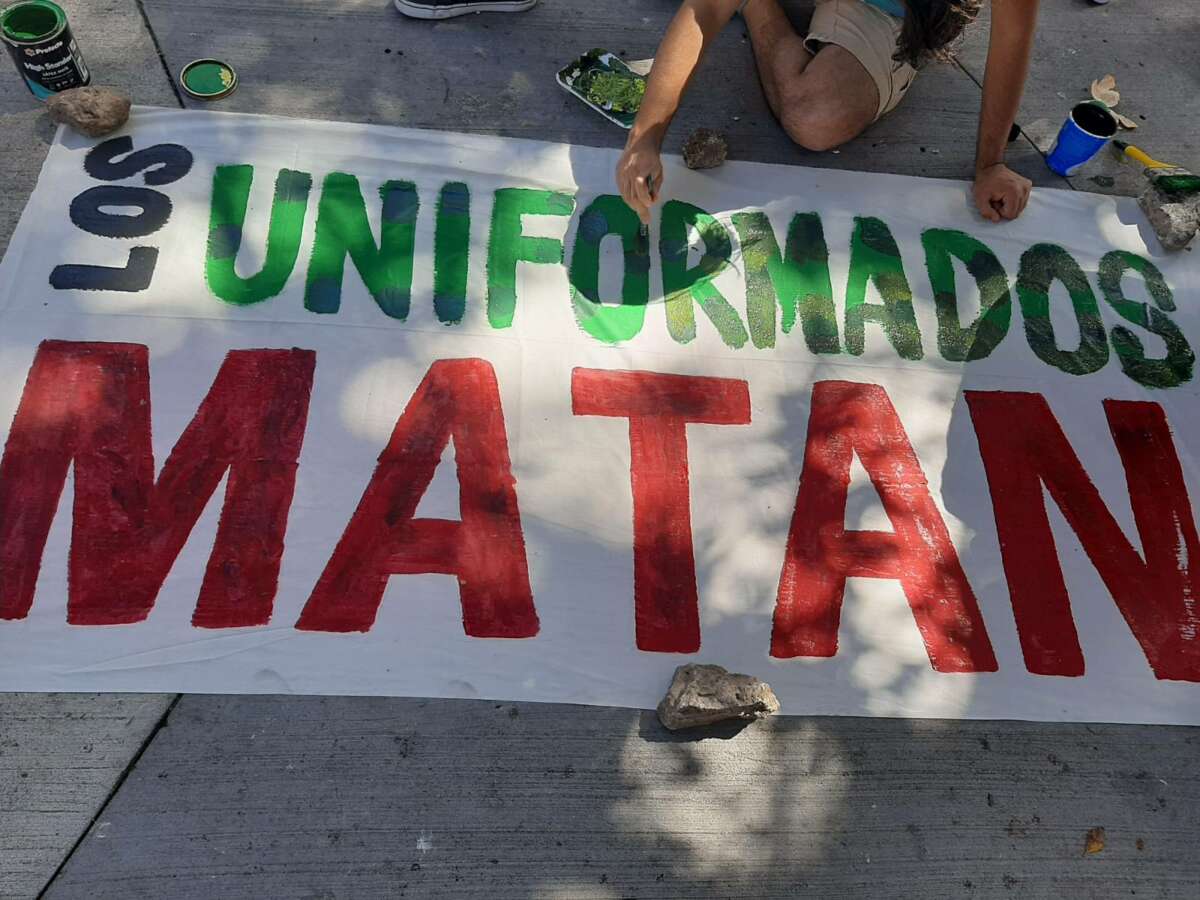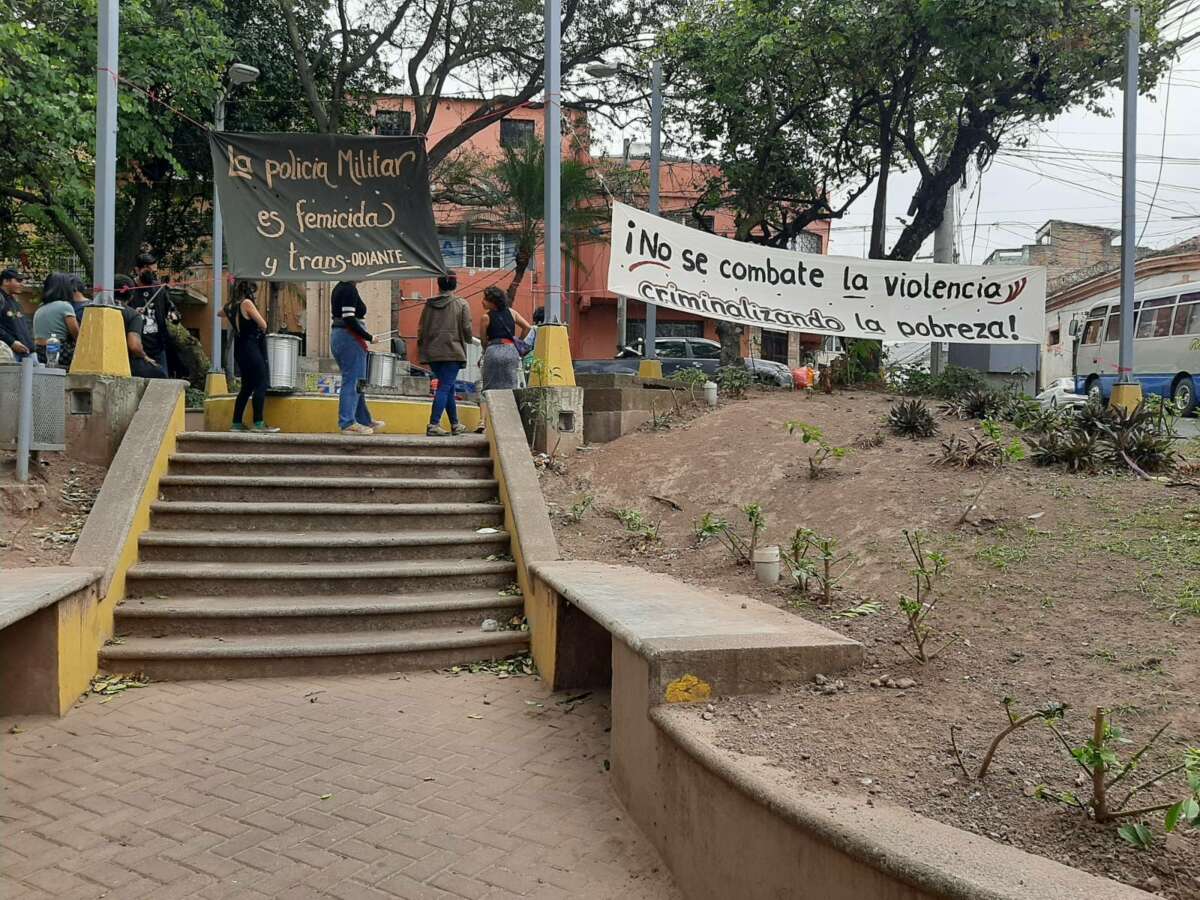Part of the Series
The Road to Abolition
Did you know that Truthout is a nonprofit and independently funded by readers like you? If you value what we do, please support our work with a donation.
In Tegucigalpa, Honduras, a group of activists has been gathering regularly on Saturday mornings to oppose one of President Xiomara Castro’s popular new policies: a state of emergency that partially suspends several fundamental constitutional rights. The measure, also known as a state of exception, is meant to be a key part of Castro’s “war on extortion,” a major and systemic problem in Honduras. Anti-militarist activists, however, say that there can be no path forward with more militarization and that the state of exception amounts to the criminalization of poverty.
Like their abolitionist counterparts in the United States, these anti-militarist activists often find themselves attacked online when they invite people out to their activities. Commenters accuse them of supporting extortion or even of being gang members themselves. Criticizing the new government carries the risk of being branded as right-wing, said one member of the group, Sofia (a pseudonym), who requested anonymity due to fears of retaliation from the police. The measures are popular, said Sofia, despite “what human rights are being trampled on,” because “people just want revenge.”
“And it’s understandable too,” she added. In Honduras as in the United States, violence is a popular response to violence.
Following in El Salvador’s Footsteps
In January 2022, Honduras elected a new president, Xiomara Castro. Castro, whose campaign was supported by many of the nation’s social movements, is the country’s first female president and first ever to be elected from a third party (LIBRE). Castro’s election signaled the end of the narco-dictatorship that was imposed after her husband, Mel Zelaya, was forcibly removed from office in 2009, and that came to be symbolized particularly by two-term President Juan Orlando Hernández.
The 12-year period after the 2009 coup was characterized by increased militarization, weakening of most if not all civil institutions, high levels of violence against activists, collusion with narcotraffickers at the highest levels of government and police, and the looting of public funds. Amid all of this, rates of violence have been extraordinarily high in Honduras and everyday people, especially those who live in areas controlled by powerful gangs or organized crime syndicates, have been profoundly affected.
Gang control of neighborhoods sometimes extends to members telling all residents within a territory where they can and cannot work (not in places controlled by a rival gang) and controlling other behaviors of daily life. The penalty for disobedience is often high, and violent.
Among the effects of this level of gang control are the “taxes” or “fees” that must be paid regularly. According to a recent survey (extortion is almost never reported to the police), Hondurans pay around $737 million in U.S. currency in these fees annually. This type of extortion, extracted in particular from people who work in the transportation sector like taxi drivers, is the major stated target of the state of exception.
Castro originally imposed the measure for 30 days, beginning on December 6, 2022, in over 200 neighborhoods in Honduras’s two largest cities. The state of exception has since been approved by the Honduran Congress and extended twice (the current one expires on April 20), and now includes 17 out of 18 departments of the country.
Under the order, six articles of the Honduran constitution are suspended, related to the freedom of movement, the right to free association and assembly, and the sanctity of the home. Security forces are also able to make arrests without warrants or normal judicial processes of probable cause, people can be detained for longer periods of time, and their homes can be broken into and searched by the police without the same judicial checks. Just under 20,000 officers from multiple agencies, including the Military Police (PMOP) created by the previous regime, have been dedicated to this effort.
Independent Honduran media outlet Contra Corriente highlighted that the state of exception will sharply increase detention rates at a moment when the prison system in Honduras is already caging almost twice as many people as it was built to hold.
The idea for the state of exception undoubtedly comes from neighboring El Salvador, where a similar program implemented by President Nayib Bukele has been renewed for just under a year, and the facts are concerning. Evidence suggests that everyday life in El Salvador has noticeably, even dramatically, improved, with residents marveling at the ways they can now circulate freely in public unimpeded by violence, but these improvements come at a high cost. So far, 64,000 people have been imprisoned, according to governmental figures, over 2 percent of the country’s entire population, and a new “mega prison” has been constructed to contain the massive incarcerated population.
A report from Human Rights Watch states that at least 90 people have died in custody in El Salvador during the state of emergency but the government has not investigated any of these deaths, and cases of abuse and arrests of innocent people abound. Public defenders say that in the current political and juridical environment, it is nearly impossible to win anyone’s release, no matter their case or circumstances.
The Salvadoran model is as popular in Honduras as it is in El Salvador. “It’s normal for people to feel calm when they can leave their colonia because the state of exception has swept people up, but what has been kept under the rug? What isn’t visible is that innocent people have been detained, and some of them haven’t come out alive,” legislator Claudia Ortiz told independent outlet El Faro, of the changes in El Salvador. “It’s shocking to know that your or my tranquility was achieved at an unacceptable price.”

Challenging the Normalization of Violence
Since the beginning of the state of exception in Honduras in December, a self-convened group of anti-militarists has been regularly organizing sit-ins in neighborhoods that are included in the order. Their purpose, said Sofía, is “to make visible the classist nature of the state of exception.” Her comrade, Suli Argentina, said they also use these spaces to share the testimonies of all the ways people have been affected by militarization, so that people can see that while extortion hurts the community, militarization causes a lot of harm as well.
The neighborhoods covered by the state of exception suffer from extremely high rates of poverty and unemployment.
These events have taken different forms, but all have been in a public space like a plaza or a park where people in the community gather or where the group can be easily seen. Many have involved collective art activities. At the first event on December 10, 2022, they worked with community members to make banners that have since been hung at later sit-ins.
A seemingly simple activity like making a banner together can involve a dialogue about militarism and patriarchy, said feminist folk singer/songwriter Karla Lara. For example, the group made one banner in honor of Keyla Martínez, a nursing student who was murdered in police custody in February 2021 after being detained for violation of a COVID curfew.
As the group was working on the banner, they were trying to decide what colors to paint it. Lara recalled that one person suggested the banner should be painted pink. Other participants engaged in a dialogue, asking why they thought pink would be effective at humiliating the police, eventually getting to the point that pink only “humiliates” because it is associated with femininity. In other words, using pink to humiliate is at its heart a misogynist idea.
Other events have included musical performances and workshops by groups such as Batucada AntiCistemica (a trans-affirming drumming group with a pun on “cisgender” in its name). Another time the group set up in a central plaza with less foot traffic but lots of cars passing by and hung the banners so that they could be seen by more people.
Overwhelmingly, the activists said, the point is to create a space in the neighborhoods to question militarism as the solution to the problems that people are experiencing. At the same time, said Sofia, a lot of caution is exercised in how the events are designed, because of the sensitivity of the issues and the risk of being seen as taking sides with the right wing. “We try to do playful activities,” she said, “so that they don’t provoke any violence either.”
Argentina says that she hopes the group can help people see “why militarization doesn’t necessarily resolve the problem at the roots, so that people will begin to understand that we are not against measures that will guarantee the safety of the population, but rather want measures taken that really eradicate the problem of this violence at its roots.”

Ending Violence Will Require Bigger Quality-of-Life Changes for All
The neighborhoods covered by the state of exception suffer from extremely high rates of poverty and unemployment. The people in them are being offered security forces — not health care, not plentiful healthy food, not art and not school. Not only has the size of the military increased throughout the years of dictatorship, said Sofía, but the security budget this year also increased under the new government, to the detriment of other public services.
Abolitionists have often grappled with calls for more policing from members of targeted communities. In their book No More Police, abolitionist organizers Andrea Ritchie and Mariame Kaba write that they understand these calls as “responses to what is perceived as a threat to take away the only resource offered by the state to respond to a multitude of problems.” Instead, they argue, abolition is about offering communities as many resources as possible, rather than the one-size-fits-all violence of policing. Policing is the only resource offered by the state to the danger these communities experience in a context of organized abandonment — danger that is created and sustained by the larger inequitable and unjust structures.
The state of exception itself is “only focused on the poorest neighborhoods … where the lack of resources is part of daily reality,” said Argentina.
Argentina and others in the group of anti-militarist activists strongly emphasize the racist and classist nature of the state of exception. They say that focusing only on these historically marginalized neighborhoods is classist, as the state of exception does not affect everyone equally, and they emphasize that extortion is also not limited to these neighborhoods. Furthermore, said Lara, limiting the measure to these neighborhoods “puts out the idea that poverty is criminal by implying that extortion is rooted in these neighborhoods.”
By suspending requirements for any judicial orders or other due process before stopping, searching or arresting people, the only criteria police need to use is who looks “suspicious” to them. “It’s pure prejudice,” said Sofía. But the arrest of poor and working-class young men, the activists said, will also stigmatize poverty as their arrests lead to the circular presumption of their guilt.
[The] years of corruption, organized abandonment and the disintegration of most institutions are an important part of the story of root causes of the violence on Honduran streets.
Honduran authorities claim there have been no human rights complaints during the state of exception. Activists interviewed by Truthout confirmed that they were personally aware of police abuses, including detention of innocent people, stemming from the decree. One person told a story of someone who had been picked up by the police and dropped off in a strange neighborhood while being threatened by them, instead of taken to a police station.
The people Truthout spoke with were not surprised at the lack of official complaints. It is unreasonable, Sofía said, to expect that people would go to the same police who have targeted them to lodge a formal complaint of police abuse, particularly within the strong culture of mistrust of the police stemming from the dictatorship and before.
These activists also said they fear retaliation for their organizing work against the state of exception. While they have not faced any physical attacks from the police at this time, members of the group are well aware that when they criticize militarism in Honduras, they are provoking the same powerful institutions that retain unchecked power to commit abuses.
The state of exception has not fundamentally changed the structure of violence, extortion and narcotraffic in Honduras, according to these activists, in part because the police and military are themselves a significant part of this structure. In Lara’s view, “The abusive culture of the police is the same as always. As much as they say these are the police of the socialist government, that there’s been a purge, that the leadership has changed, the police are as violent as ever. I would say even more so. Because the state of exception gives them total impunity.” Besides, she adds, everyone knows who really controls the drugs in the neighborhood: the police.
Former President Juan Orlando Hernández is currently facing trial in the United States on charges of using his office to facilitate the traffic of over 500 tons of cocaine. It is a matter of public record that his government was deeply entangled with narcotrafficking, and it has been established, partially through his brother’s conviction, that he used millions of dollars from the country’s now-ailing health system to fund his reelection campaign, itself only possible as a result of a judicial coup he headed. These years of corruption, organized abandonment and the disintegration of most institutions are an important part of the story of root causes of the violence on Honduran streets.
Although the state of emergency is popular, this group of anti-militarist activists are not the only ones opposing it. The Civic Council of Popular and Indigenous Organizations of Honduras (COPINH, for its acronym in Spanish), the organization founded by martyred environmentalist Berta Cáceres, has also come out in opposition. Their statement emphasizes that the roots of the structural violence Hondurans face are not to be found in the precarious neighborhoods listed in the state of exception but in financial institutions, among other elite actors, and among the security forces.
There may be no better evidence of the fact that the underlying structure of violence in Honduras remains unchecked by the state of exception — “that militarization doesn’t work to improve the conditions of people’s lives,” as Argentina said — than the wave of assassinations against land and human rights defenders that has taken place during the period of emergency. Since the end of December 2022, at least eight people involved in social movements have been murdered. In addition, three Afro-Indigenous Garífuna women were murdered in January in Puerto Cortés, a zone that is under the state of exception.
Hondurans, like people in the U.S. and many around the world, are being sold a specific type of safety. This safety can be bought quickly by putting thousands more police and military on the streets, but it necessitates increasing rather than decreasing the overall level of violence, as long as the definition of violence includes police abuse, raids and incarceration.
Kaba and Ritchie wrote that abolitionists need to “confront the stories we are told about policing and safety that fail to add up,” including the way “police colonize our imaginations.” Lara mentions, too, that “we learn in TV series that police are important. We see on ‘Chicago Fire’ that on top of that they are good looking.” This has to change, she said. But the work of creating alternatives to policing is slow and not as easy to explain.
Militarized, violent solutions to “crime” are sold to people constantly, through increased police and security forces on the street, through television shows and through the discourses of politicians. Rarely are the complex, local, multifaceted, system-changing alternatives portrayed.
“The ugly part [of this militarization] is that people believe it’s good that they do it, that they have succeeded in getting that into people’s heads,” Lara said.
That is why it is so critical, these activists say, to create this public space to question militarization. “As part of the sexually diverse community and as a woman, I personally understand very clearly, I don’t trust the police.” Echoing a popular movement slogan, she added that the police “no nos cuida, nos asesina” — “The police don’t care for me or my community, but kill us.”
Nevertheless, Argentina said, “We are going to keep fighting for a bet on life.”
Press freedom is under attack
As Trump cracks down on political speech, independent media is increasingly necessary.
Truthout produces reporting you won’t see in the mainstream: journalism from the frontlines of global conflict, interviews with grassroots movement leaders, high-quality legal analysis and more.
Our work is possible thanks to reader support. Help Truthout catalyze change and social justice — make a tax-deductible monthly or one-time donation today.
